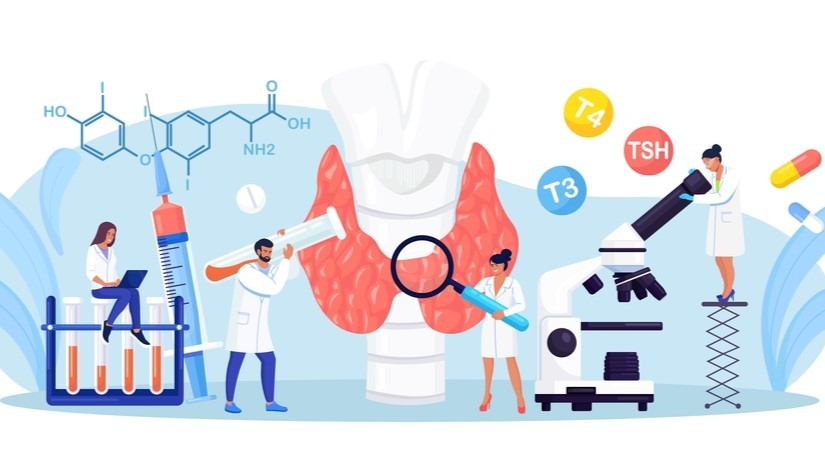Table of Contents
Definition of Thyroid Function Tests
Thyroid function tests are a series of blood tests that are used to measure the functioning of the thyroid gland.
It is mainly helpful in regulating metabolism, mood, and the generation of energy.
Hormones released – Hypothalamus – TRH, Pituitary- TSH, and Thyroid gland – T3 & T4.
TESTS:
The thyroid function tests performed are
- T3 – Triiodothyronine.
- T4 – Thyroxine.
- TSH – Thyroid stimulating hormone.
T3 Triiodothyronine test:
This is a biologically active hormone. It is an autoimmune disorder. Its normal range is 100- 200ng/dl.
This is suggested if T4 & TSH tests suggest hyperthyroidism.
Abnormality indicates Graves’s disease.
T4 Thyroxine test:
The normal range is 50-160 or 9-25 pmol/L. Here T4 gets converted into T3.
Here T4 is of two types one is bound to proteins and the other is free T4.
TSH test:
The normal range is 0.4 – 4.0 mu/L.
RESULTS:
- A high TSH and low T4 – Hypothyroidism.
- A low TSH and high T4 – Hyperthyroidism.
- Abnormal TSH with normal T4 – Thyroid disorder.
- Low TSH and low T4 – Disorder of the pituitary gland.
Pulmonary Function Tests
- Inspiratory capacity: It is the sum of Tidal volume and Inspiratory reserve volume. (500ml+3100ml = 3600 ml)
- Residual volume: It is the sum of residual volume and expiratory reserve volume (1200ml + 1200ml = 2400ml).
- Vital capacity: It is the sum of Inspiratory reserve volume, tidal volume, and expiratory reserve volume (4800ml).
- Total lung capacity: It is the sum of vital capacity and residual volume (4800ml+1200ml = 6000ml).
- Tidal volume: It is the amount of air exhaled or inhaled at rest (500 – 750ml).
Tests Associated with Cardiac Disorders
Cardiac biomarkers are the substances that are released into the blood when the heart is damaged or stressed. These tests are mainly of two types.
- Laboratory tests
- Non-laboratory tests
LABORATORY TESTS:
- Troponin test
- Creatine test
- Myoglobin test
Troponin Test:
Troponin is a protein found in skeletal and contractual fibers of the heart.
Troponin 1 & T are cardiac specific.
Normal range is 0 – 0.3 ng/ml.
Creatine Test:
It is an enzyme that catalyzes the conversion of Creatine to phosphocreatine degrading ATP to ADP. This can be measured as ck-mm, ck-mb, CK- BB.
RESULTS:
The normal range is for males-171U/L, and females – 145U/L.
Myoglobin Test:
This test is usually performed to measure the level of protein Myoglobin in blood.
The test is mainly performed to detect muscle damage.
RESULTS: The normal range is 0 – 85 ng/ml.
NON – LABORATORY TESTS:
ECG or EKG test:
It is a tool that is used to measure and record the electrical activity of the heart. It is mainly used to detect defects in the heart like:
- Atrial enlargement
- Ventricular hypertrophy
- Arrhythmia.
- The P wave is a record of electrical activity through the upper heart chamber.
- The QRS complex is the movement of electrical impulses through the lower ventricles.
- The ST segment appears as a straight line between QRS and T wave. This shows ventricle is contracting with no electrical flow.
- The T wave shows when ventricles are setting for the next muscle.
Chest X-Ray:
- It is a non-invasive method that is used to record medical imaging.
- It is mainly used to check the enlargement of the heart.
CT Scan:
it is a scan that combines many X-ray images with the help of a computer to generate cross-sectional views of the body.
It is mainly used to evaluate:
- The heart muscle.
- The coronary arteries
- The pulmonary veins
- Pericardium.
MRI Scan:
This is useful for detecting structural problems with the heart such as congenital heart disease, function of heart valves, etc.
Cardiac Catheterization or Coronary Angiogram:
Here a catheter is placed through the IV and into the blood vessel in the leg or neck. In the test, a contrast dye is injected through the catheter so that x-ray valves, coronary arteries, and heart chambers are clearly seen in the x-ray machine. The test may last for 30-60 min.
This is mainly used to examine
- Measure pressure and blood flow in chambers and in large arteries of the heart.
- Measure the oxygen concentration.
Tread Mill Test:
- The stress test is mainly used to assess the heart condition during exercise when the demand for oxygen increases.
- It measures the patient’s responses to workload.
Make sure you also check our other amazing Article on: Poison Information Centre
